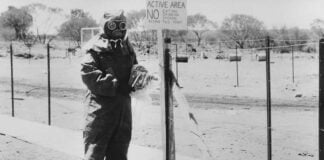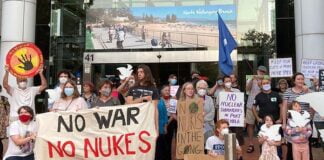Academic and author Elaheh Rostami-Povey visited Sydney recently, speaking on her research in Afghanistan under the US-led occupation. Below we reprint part of a speech she gave
I HAVE been to Afghanistan twice. In February 2002 just after the fall of the Taliban women and men that I talked to were extremely hopeful that things would [improve].
The idea was that I write a book about Afghan women, and I came back with about 70 or 80 interviews.
Afghanistan basically has been involved in wars [since] the Cold War. The Americans supported one set of so-called warlords and the Russians supported another set of warlords, and they ended up in a civil war.
I was particularly impressed when I was there the first time that women I talked to had turned their homes [under] the Taliban into secret schools. Any skills that they had—from hairdressing to cooking, to chemistry to history to German or Russian language they passed on to their children, [defying] the Taliban [ban on] education [for women].
Afghan women
These were not just schools—they were a network of activities between women. This was very important for these communities to survive and [keep alive the hope of] reconstructing their lives after the war ended.
The other [thing this showed] was solidarity between women and men. We are bombarded by the media and politicians [with the idea] that Iraq, Afghanistan, Palestine can’t sort our their problems—they are full of hatred for each other and we’ve got to go in and sort out their problems for them. [They say] that Islam is the problem—Muslim men are the problem.
The way Afghan men supported their women in secret schools was very interesting. It was more than simply support because if the Taliban found out that a household was turned into a school they would [hold] the man responsible for what goes on in the household. He would be arrested, tortured and sometimes killed. [This shows that] Afghan or Muslim men are not the animals they have been portrayed in the West.
I then looked at Afghan women who lived in the diaspora. Seven million Afghans had to leave Afghanistan over the years—something like three million lived in Iran, three million lived in Pakistan, and one million either lived in other countries in the region or moved to the West.
I went to Iran and Pakistan to learn about the experience of Afghan women and men as refugees, then I interviewed Afghans in London and Los Angeles.
They were all subject to racism in different ways, and all used as cheap labour like many other refugees.
There were also striking differences. In Iran and Pakistan Afghan women were subject to racism but they had the support of women’s organisations, especially in Iran. Within this Islamic context they were able to pull themselves up and fight for their gender rights.
For example I met a girl whose father said to her when she was nine years old you are now too tall and you can’t go to school. But then when she was 15 they set up adult literacy classes in this place and she went to the classes and said that “Now I stand up to her father and say, nowhere in Islam does it say women can’t be educated.”
In contrast what I found in UK and US was that especially since 9/11 they were saying: “We are under so much attack because of the new phenomenon of Islamophobia we have no time to fight for our gender rights within our community. All our efforts go to defend our Muslim Afghan identity.”
In fact I actually found Afghan communities in the UK and US more conservative than the Afghan communities in Iran and Pakistan.
Afghanistan under occupation
I went back to Afghanistan in 2005. The situation has got much worse since 2005—the President, Karzai is only in control of 30 per cent of the country and 70 per cent is under the control of the Taliban. The government relies on warlords who are engaged in the opium economy.
Everybody was saying to me—where does all the money from opium go, where do the billions of dollars of aid that has gone to Afghanistan go? Why don’t we have schools, whey don’t we have hospitals, why don’t we have employment?
There are people in Afghanistan who are getting rich—palaces are going up in central Kabul and a few other places. But outside of them women and men are queuing in bare feet begging for a piece of bread from [humanitarian aid] NGOs.
Even the former NATO commander General James Jones said a few months ago that urgent changes were required to prevent Afghanistan becoming a “failed state”.
Afghanistan is one of the five poorest countries in the world. Forty per cent of people in urban areas and 70 per cent of people in rural areas do not have access to clean water, life expectancy is 44, only 30 per cent in urban areas are literate, and in rural areas there is less than 1 per cent literacy.
Everyone talks now about Iraq being a mistake. And Afghanistan is becoming like Iraq. In the media [we now hear] the term “Iraqification” of Afghanistan used. In other words security is bad and is getting worse. There is an increase in roadside bombings, suicide bombings and kidnappings.
Both the UN and Oxfam are saying that they can’t work in Afghanistan any more because four million people are caught in the middle of the war between foreign soldiers and the Taliban, and they cannot get to these people.
I think there is a solution—troops out. To argue that if they come out Afghanis will kill each other, that these people can’t sort out their problems, so we need to go in, is the old colonial mentality.
You have probably heard of Joseph Stiglitz—he is a neo-liberal who used to be head of the World bank. He actually calculates what the three trillion dollars spent on the Iraq war could have been spent on in the West, and a fraction of that money could have been spent in Afghanistan to build the economy of Afghanistan, or in Iraq.
I think we should argue it is the responsibility of the west who have created this situation in Iraq and Afghanistan to pour in money to rebuild.
They did it after the Second World War with Japan and South Korea. With the amount of money spent on the war, tens of Iraqs and Afghanistans could have been reconstructed by now.
Elaheh Rostami-Povey is author of Afghan women: identity and invasion and lectures in development studies at the School of Oriental and African Studies, London





